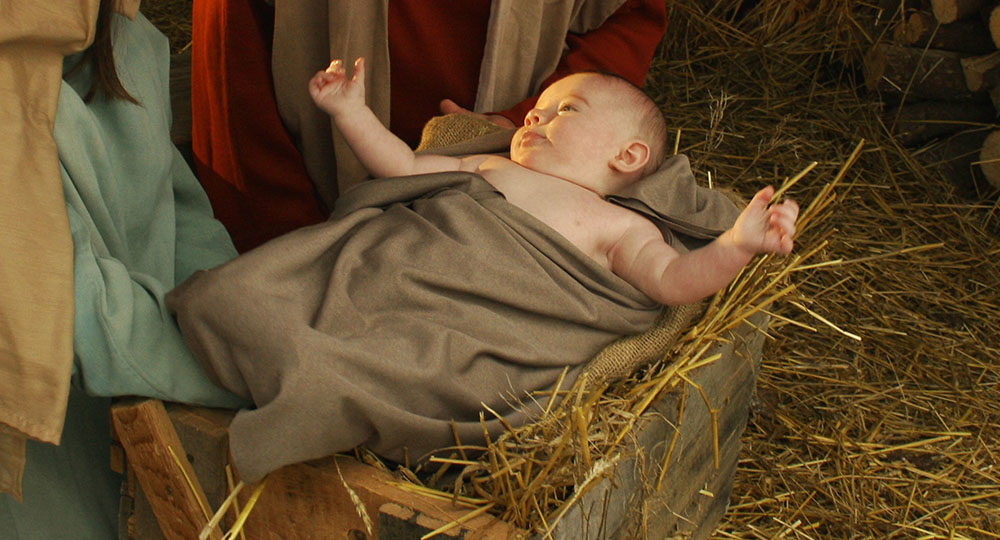No Other Name
As Christmas approaches, many people concentrate on gifts and decorations and enjoying the season. Fewer think about who Jesus is and what it meant for Him to come to Earth. But without the Incarnation, humanity would be lost.
Jesus is the eternal Word of God. Technically, it is incorrect to refer to Him as Jesus prior to His birth. Before then He was the eternal Logos—the eternal Word—or the eternal Son of God: “In the beginning was the Word [Greek, Logos], and the Word was with God, and the Word was God” (Jn. 1:1).
He was the Creator of the world (v. 3). In addition, He was the Angel of Jehovah who appeared to Moses and Abraham and many others and who accompanied the nation of Israel as it wandered through the wilderness. He is the expression of God: the one who reveals God and manifests God to men.
Then, at a point in history predetermined by God, “the Word became flesh and dwelt among us” (v. 14).
Forever a Mystery
The Bible teaches that Jesus is also the Son of Man. He is as real a human being as you and I. Scripture calls Him “that Holy One [“holy child,” NASB] who is to be born,” expressing His humanity (Lk. 1:35). He is also called David’s Son, referring to His position as direct heir to the throne of King David.
So what we have is a mystery. Gabriel said to the virgin Mary, “You will conceive in your womb and bring forth a Son, and shall call His name JESUS” (v. 31).
The Incarnation is something we will never understand. The God who dwelt next to the Father in eternity past—God the Son, the Logos—took on human flesh, prompting the angels to declare to the shepherds the evening He was born, “Behold, I bring you good tidings of great joy which will be to all people. For there is born to you this day in the city of David a Savior, who is Christ the Lord” (2:10-11).
It was the greatest miracle and turning point of all history.
Jesus also is the God/Man. Scripture says He “made Himself of no reputation,” meaning He “emptied Himself” (Phil. 2:7). The apostle Paul wrote, “Being in the form of God, [He] did not consider it robbery to be equal with God, but made Himself of no reputation [emptied Himself], taking the form of a bondservant, and coming in the likeness of men” (vv. 6–7).
Jesus, who possessed the glory of God from eternity past, set aside the outward manifestation of His glory and enrobed Himself in human flesh so that He appeared to be merely a man. No one could tell by looking at Him that He was deity.
To the eternal Logos now was added a human nature: “And the Word became flesh and dwelt among us, and we beheld His glory, the glory as of the only begotten of the Father, full of grace and truth” (Jn. 1:14). The term for this is Incarnation, meaning “to come in the flesh.” So Jesus became the God/Man.
Jesus is complete deity and perfect humanity, united without mixture. There is no blending of these two natures. He is not at times 90 percent deity and 10 percent humanity. He is complete deity, perfect humanity, united without mixture in one person forever.
No one apart from the Father, Son, and Holy Spirit can fully explain this truth. That’s where we embrace, by faith, the biblical teaching about the person of Jesus Christ.
Furthermore, it is important to understand that He will always be so. When we meet Him in glory, He will be glorified. Yet He will have a resurrected body because of the Incarnation, and He is that Person now and forever.
The Final Lamb
On the other hand, Jesus the God/Man is also God’s Lamb. Old Testament saints understood that “according to the law almost all things are purified with blood, and without shedding of blood there is no remission [forgiveness]” (Heb. 9:22).
God had established a system of animal sacrifice to teach Israel how unacceptable sin is to Him. Each time someone sacrificed an animal at the Temple in Jerusalem, he was reminded that sin brings death. Death is necessary to atone for sin.
The animal’s blood, which represented its life, would be poured on the altar. Once a year, on Yom Kippur (Day of Atonement), Israel’s high priest would put it on the Mercy Seat in the Temple’s Holy of Holies, signifying that God had, for another year, accepted that sacrifice in lieu of the payment that was actually due. As Scripture says, “It is not possible that the blood of bulls and goats could take away sins” (Heb. 10:4). Those who were close to God and carefully read the Hebrew Scriptures understood that fact.
So God provided another sacrifice: the Lamb of God, who is Jesus Himself. John the Baptist understood. When he was baptizing people beyond the Jordan and saw Jesus walking toward him, he declared, “Behold! The Lamb of God who takes away the sin of the world!” (Jn. 1:29).
The author of Hebrews understood, too, from the Septuagint’s version of Psalm 40:6: “‘But a body You have prepared for Me.’ By that will we have been sanctified through the offering of the body of Jesus Christ once for all” (Heb. 10:5, 10). God prepared a human body for His Son to become the final atonement for sin.
As Isaiah prophesied, “All we like sheep have gone astray; we have turned, every one, to his own way; and the Lᴏʀᴅ has laid on Him the iniquity of us all” (Isa. 53:6).
Those who carefully read Isaiah understood a man was coming who would be the Lamb, whose blood would take away the sins of the world.
The apostle Paul, a Jewish scholar, wrote, “He [God] made Him [Jesus] who knew no sin to be sin for us, that we might become the righteousness of God in Him” (2 Cor. 5:21). God took your sin and mine and transferred them to Jesus.
The only way you and I can atone for our sin is to die and be separated from God forever. Atone means to “make reparation, to make payment for.” If, for example, you are convicted of violating a traffic law, you can pay the fine or do time in jail. Paying for sin, however, means spending eternity in the Lake of Fire, severed from God forever. That is the fine: eternal death.
Jesus came to Earth to be our substitute. We have two choices: pay for our own sin or accept God’s Lamb and receive forgiveness and His righteousness through faith.
The Jewish apostle Peter put it this way: “For Christ also suffered once for sins, the just for the unjust, that He might bring us to God” (1 Pet. 3:18).
The Incarnation manifests to us the incomparable, incomprehensible love of God, who had compassion on us—a world of lost sinners—and sent a Deliverer.
As you prepare for the Christmas season, take time to ponder the great sacrifice God the Son made in coming to Earth. And give thanks to Jesus, remembering, “There is no other name under heaven given among men by which we must be saved” (Acts 4:12).







